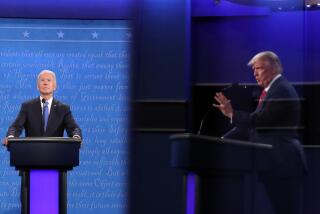Why 8% unemployment isn’t sinking Obama’s reelection hopes
- Share via
In my Sunday column, I briefly mentioned a counterintuitive idea: When unemployment is high, Democratic candidates may benefit, even when the Democrat is an incumbent.
How can that be? Don’t voters punish the party in power when unemployment goes up? Won’t voters desert President Obama because unemployment appears stuck at 8.1%? After all, since 1936, no president has been reelected when unemployment exceeded 7.2%.
Evidence suggests that it’s not so simple; unemployment affects voters in a more complicated way than a simple reward-and-punishment model. In fact, voters often favor Democratic candidates during periods of high unemployment, even if the Democrats are the party in power.
COMMENTARY AND ANALYSIS: Obama vs. Romney
I’m indebted here to John R. Wright, a political scientist at Ohio State University who crunched the numbers from four presidential elections and 175 gubernatorial elections to come up with this finding, which he explains in a paper to be published soon in the American Political Science Review. (I’m also indebted to the Monkey Cage, a wonderful political science website that pointed me to Wright’s work.)
Wright’s basic finding: “Unemployment and the Democratic vote move together. Higher rates of unemployment … lead to larger vote shares for Democratic candidates, and lower unemployment leads to lower vote shares. This relationship holds regardless of the incumbent party. Consequently, when Democrats are in power and unemployment increases, they are not punished.” On average, across all those gubernatorial elections, an increase in unemployment by 1% appeared to produce an increase in the Democratic vote of about one-fifth of 1%.
Why? Mostly, Wright suggests, because voters tend to think Democrats are better able to deal with unemployment than Republicans are, according to public opinion polls. “The Democratic Party ‘owns’ unemployment” as an issue, he writes, in much the same way that Republicans “own” fiscal responsibility and national security; many voters give them the benefit of the doubt. “When unemployment is high or rising, Democratic candidates can successfully convince voters that they are the party best able to solve the problem.”
INTERACTIVE: Battleground states
(Does that mean Democratic officeholders should cynically scheme to keep unemployment high? Probably not, Wright notes; if they did, it would ruin their reputation for solving the problem.)
Much of this year’s presidential campaign, of course, has been an effort by Mitt Romney to convince voters that the opposite is true: that as a successful businessman, he’s better able to solve the problem of unemployment, and that Republican policies will work better than Obama’s. To many Romney supporters, that seems like an easy case to make. Wright’s research suggests one reason that it’s turned out to be harder than it looked.
I hear you asking: But what about Jimmy Carter? Didn’t 7.5% unemployment doom his reelection? Again, it wasn’t so simple. When Carter ran in 1980, the economy was in a recession, not a recovery. Inflation had soared over 15% (it’s now under 2%). Those other factors help explain why Carter’s job-approval rating in the September 1980 Gallup Poll had sunk to 37%, in contrast to Obama’s 50% today.
ALSO:
The pain-at-the-pump blame game
McManus: Are businessmen better presidents?
More to Read
A cure for the common opinion
Get thought-provoking perspectives with our weekly newsletter.
You may occasionally receive promotional content from the Los Angeles Times.










